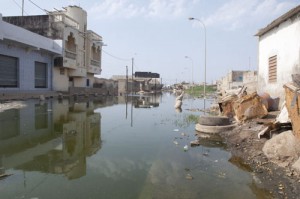Floods won’t stop school in Senegal

Talk about a bad first day at a new job: Labisse Diop, head teacher at a primary school outside Dakar, Senegal, has a story few could top. At the beginning of the school year last fall, he showed up for work to find his school completely flooded. “I was really surprised…I said ‘this water can’t be removed, it’s too deep…’ and I asked myself why others who worked here before had not addressed the situation.”
Staff at the Thiaroye Primary School, in the city of Pikine, were already at work, pumping the water out of the school and into a drainage channel and away from the neighborhood. But they needed fuel to run the pumps – and they got it from an organization called Eau-Vie-Environnement (Water-Life-Environment, EVE for short). “Thanks to EVE, they made it easier by bringing fuel,” Diop says.
I spent the better part of two days in Pikine last week. It’s the poorest suburb of Dakar, and as we have come to expect in such places, the people there are severely affected by something as simple as unusually heavy rains. It’s a very densely populated city with few good jobs or extra resources to help people affected by floods. Despite EVE’s best efforts, there are still flooded roads, and the stagnant water is breeding fluorescent green algae and mosquitos. People are still crossing watery areas on paths of old tires, rocks, and raised wooden platforms.
Oxfam helped EVE distribute water purification chemicals, clean out and repair latrines, remove garbage, and distribute soap and mosquito nets to nearly 3,000 households. Eve and Oxfam also gave cash to 700 of the poorest and worst-affected households, so they could buy food, clothing, and anything else they might need.

Last fall, EVE provided 15,000 litres (about 4,000 gallons) of fuel to run 116 pumps to remove water from 643 homes, seven schools, 18 mosques, and 228 roads in about seven of Pikine’s 16 districts. The organization estimates it pumped over a million cubic meters of water —this is something like 264 million gallons of water, enough to fill more than 400 Olympic swimming pools. EVE is still pumping water in some places in Pikine today. They did this with a grant from Oxfam’s Saving Lives 24/7 emergency fund.
Ceiling getting lower
Diop says they brought in several truckloads of sand for the Thiaroye school yard, a tactic to raise the level of the ground above the waters. The school has been doing this for years, along with raising the floors in the classrooms. Anyone over five feet tall has to duck a little to get under the roof to enter a room. The bottom of the classroom windows are now below your knee.
Pikine is so low, and the water table is so high, more flooding is inevitable if there are any heavy rains this year. The school is bricking up lower windows to keep water out, and building low walls in thresholds and other places to replace the need for sandbagging. Diop says they have asked the ministry of education for help with these repairs, and he has proposed raising the roof of the school to accommodate the rising floor level.

Oxfam and EVE are looking at long-term solutions to the chronic flooding at Pikine. EVE’s Executive Secretary Abdou Diouf says Oxfam’s assistance is crucial in this area. “There are areas that are permanently flooded,” he says. “We need durable solutions.” EVE is now working with local mayors and other elected officials to push the national government to devote funds to improving drainage and other measures to reduce Pikine’s vulnerability.
They lost about two months of classes to the high waters at Thiaroye primary school last fall. “Whatever the situation,” Diops says, “I can’t close the school—the children have the right to an education, and we have an obligation to them.”
